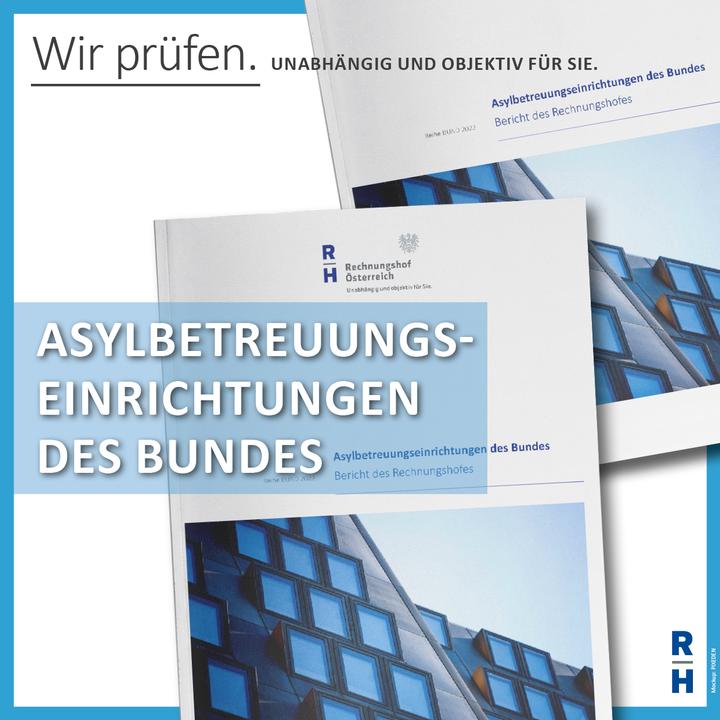Special audit: federal asylum accommodation and care facilities

Today, the Austrian Court of Audit (ACA) published the report on its special audit entitled "Federal Asylum Accommodation and Care Facilities“ upon the request of Members of Parliament (MPs), who posed 29 questions on this matter. The audit request of the MPs Herbert Kickl, Wolfgang Zanger and others, concerned, inter alia, legal, organizational, financial and staff-related measures of primary care and the contracts concluded with the accommodation and care facilities. In accordance with the request, the audited period spans the years from 2013 through 2017. For reasons of topical relevance, the ACA expanded the period until 2020.
The ministry had to develop capacities
The Federal Ministry of the Interior is in charge of ensuring the initial reception of asylum seekers. The Federal Government shall guarantee the primary care for asylum seekers in its accommodation and care facilities until it is clarified through the admission procedure whether Austria is responsible for the asylum procedure. Only then can asylum seekers be assigned to the provinces for the provision of primary care. In principle, the requirements for federal care are higher than for provincial care, as the accommodation of persons in need of protection must be possible at any time.
From 2013 to mid-2014, the Federal Ministry of the Interior was able to provide needs-based federal care in the facilities available until then. Due to the sharp increase in the number of asylum applications, the lack of own reserves and the lack of accommodation facilities in the provinces, it faced the urgent need to develop further capacities, especially in the wake of the migration crisis in 2015/16.
As already outlined by the ACA in its audit report "Assistance and Support Services of the Austrian Armed Forces for Border Management“ published in 2020, an average of 131,500 refugees arrived in Austria per month from September 2015 to February 2016. As additional care facilities were created and emergency accommodation was provided at short notice, it was possible to prevent homelessness among asylum seekers. However, it was not always possible to achieve a solution that would have yielded the most favourable economic and legal results for the Federal Ministry of the Interior. Especially at the height of the migration crisis in 2015/16, the Federal Ministry of the Interior faced a predicament that weakened its negotiating position and increased the pressure to conclude contracts promptly.
Re-negotiating rental contracts
Since 2013, the Federal Ministry of the Interior has entered into 37 contracts related to the opening of new federal accommodation and care facilities, mostly with private contractors. Of these facilities, seven were in active use in December 2020; three were reactivated in the wake of the COVID-19 pandemic. 19 were closed and their respective contracts terminated. Eleven accommodation and care facilities were shut down in December 2020 while the contract was still in effect; three of these were used by the Federal Ministry of the Interior as a depot.
The ACA notes critically that the Federal Ministry of the Interior is, on the long term, bound to individual rental agreements for up to 15 years, which has created a considerable initial financial burden. Furthermore, the ministry’s possibilities are limited to respond flexibly to changed framework conditions. The ACA recommends to evaluate the lease agreements on the accommodation and care facilities and to re-negotiate and adjust them, if possible, in order to minimize adverse consequences.
Developing a strategy for efficient crisis management
The ACA’s auditors also stress critically that the Federal Ministry of the Interior failed to define a process and establish a strategic concept for crisis situations in which the number of asylum applications see a substantial rise within a short period of time. It could therefore respond to an increased need for accommodation only on a short-term basis.
During the migration crisis of 2015/16, different organizational units of the Federal Ministry of the Interior were deployed for the search and suitability assessment of properties. Responsibilities were not clearly regulated. A suitable strategy should be developed – both for efficient crisis management and for the procurement of accommodation facilities.
Taking precautions for future developments
From the ACA’s viewpoint it is – in the light of the tasks of the Federal Government specified in the primary care agreement – indispensable that the Federal Ministry of the Interior takes adequate precautions in order to be able to address another possible increase of the number of asylum applications. Although the Federal Ministry of the Interior had data on asylum, immigration and primary care at its disposal, it lacked a structured and comprehensive assessment of the required capacities.
A holistic concept for the provision of precautionary capacities for the care of asylum seekers by the Federal Government should be developed based on economic considerations and adapted to the respective target groups and the length of stay.
- pdf Datei:
- 6,041.2 KB
Report: Federal Asylum Accommodation and Support Facilities (in German)
From September 2020 to February 2021, the ACA carried out an audit of the federal asylum accommodation and care facilities at the Federal Ministry of the Interior. The audit was performed in accordance with Article 126b para. 4 of the Federal Constitutional Law based on a request pursuant to section 99 para. 2 of the Austrian National Council Rules of Procedure Act 1975, which was issued by the Members of Parliament Herbert Kickl, Wolfgang Zanger and others on 27 February 2020 (291/A).


